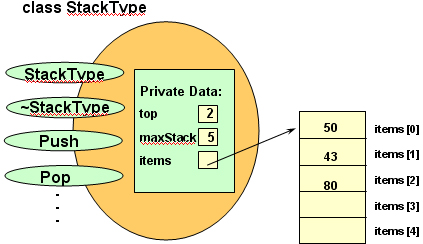Class Templates
|
A class template allows the compiler to generate multiple versions of a class type by using type parameters. The formal parameter appears in the class template definition, and the actual parameter appears in the client code. Both are enclosed in pointed brackets, < >. |
|
The actual parameter to the template is a data type. Any type can be used, either built-in or user-defined. When creating class template Put .h and .cpp in same file or Have .h include .cpp file |
Example: Creating a class template for a stack so that can declare to hold different data types
|
How to implement ....e.g. a stack(compare to non-template version of a stack)
//--------------------------------------------------------
// CLASS TEMPLATE DEFINITION
//--------------------------------------------------------
#include "ItemType.h" // for MAX_ITEMS and ItemTyp
template <class ItemType> // formal parameter list
class StackType
{
public:
StackType( );
bool IsEmpty( ) const;
bool IsFull( ) const;
void Push( ItemType item );
void Pop( ItemType& item );
ItemType Top( );
private:
int top;
ItemType items[MAX_ITEMS];
};
//--------------------------------------------------------
// SAMPLE CLASS MEMBER FUNCTIONS
//--------------------------------------------------------
template <class ItemType>
|
Better Alternative .....dynamic array implementation (using pointers) |



